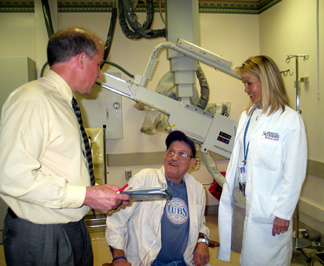 |
Harlan Cordry, seated, talks with Jim Melson, manager of UNMC pulmonary clinical research, and Judy Lane, research coordinator. |
Anthony Floreani, M.D., principal investigator of the UNMC study, said the drug would be evaluated for its effectiveness in stopping the disease progression and for its ability to improve survival and quality of life.
“We are looking at patients who have early or mild to moderate forms of the disease,” Dr. Floreani said. “Over time, IPF affects a patient’s ability to do day-to-day activities, until finally patients become breathless at rest.”
The cause is unknown, he said.
IPF is a disease characterized by progressive scarring (fibrosis) of the lungs. Symptoms include a progressively worsening shortness of breath, which makes it difficult to perform routine tasks, such as walking. The loss of lung function ultimately leads to death. There is no FDA-approved treatment for the more than 80,000 patients in the United States who have IPF.
When Harlan Cordry of Blue Springs, Neb., began having symptoms, he thought he had pneumonia. “I thought it would pass,” said Cordry, one of Dr. Floreani’s patients. “I was having shortness of breath and an uncomfortable feeling in my chest.”
Cordry, who went into semi-retirement this year, said he is happy about his involvement in the study. “The drug is very expensive,” he said. “This is one way to get it. I don’t think insurance will cover it. What I’ve read on the Internet indicates it has a good chance of working. I’m optimistic. I feel good, but I want to keep feeling good. I’m worried about it getting worse.”
Interferons belong to a family of naturally occurring proteins produced by cells of the immune system. There are three classes of interferons: alfa, beta and gamma. Although their activities overlap, each class has different effects. Interferons direct immune system attacks on viruses, bacteria, tumors and other foreign substances that can invade the body. Once interferons have detected and attacked a foreign substance, they alter it by slowing, blocking or changing its growth or function.
Adults with IPF may be eligible to participate in the clinical trial, known as INSPIRE (International Study of Survival Outcomes in Idiopathic Pulmonary Fibrosis with Interferon Gamma- 1b Early Intervention), if they are between the ages of 40 and 79, have been diagnosed within the past 36 months, and meet trial eligibility requirements. Those enrolled will receive the investigational study drug or placebo by subcutaneous injection three times a week for a minimum of two years.
For more information, contact Jim Melson at UNMC, (402) 559-8592, or visit www.inspiretrial.com.